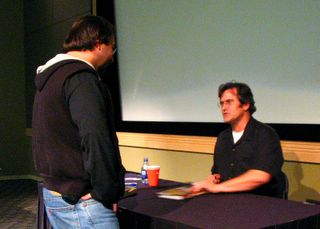I've just returned to work from a week's vacation. One of the things I was able to do while off from work is read several books. Since I like to post book reviews to my blog, I have some writing to do!
Blink, by Malcolm Gladwell, is his followup to The Tipping Point, but now focused on those first few seconds or less when a person is confronted with a new situation and makes a judgement about what is observed. He discusses many examples, from art forgery detection to
John Gottmann's divorce prediction where people use what he calls "thin-slicing" to quickly make highly accurate decisions with what appears to be minimal or insufficient information. Gladwell also covers how to know when to trust or not trust such insights.
The book is a good read overall, flowing well from topic to topic, example to example, with one exception. This book could have been about 20-50 pages shorter if Gladwell had left out the repetitive references to material previously covered, and would have been better for it. Despite this shortcoming, there's more than enough interesting material to keep the reader engaged throughout.
For a shorter version of the basic concepts, Business 2.0 published an article called "
How to Think With Your Gut" by Thomas A. Stewart in November of 2002. I'd read that article at the time, so Gladwell's discussions of a group of Marines wargaming with guys that work the trading floor on the New York Stock Exchange was already familiar.
I've never read The Tipping Point, but after reading Blink, I will.

